Kamayan in Tagalog translates to “by hand,” and describes the method of eating with your hands. It’s best used during a boodle fight where you share a meal with friends and family over a banana leaf-lined table filled to the max with delicious ulam (or main dish).
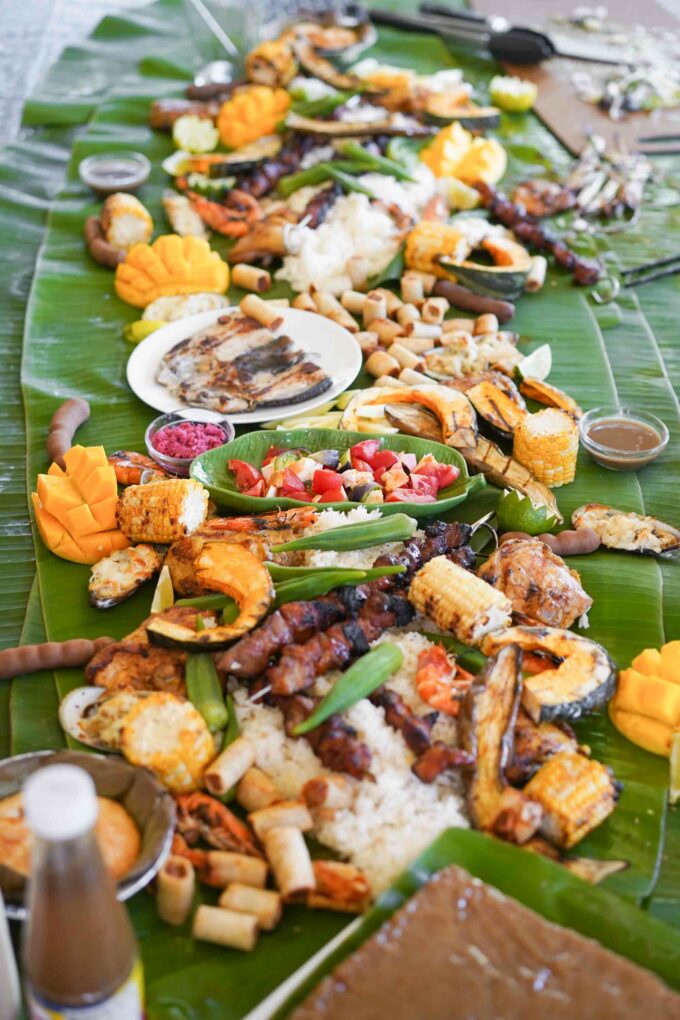
What’s the meaning of a boodle fight?
Eating kamayan was the traditional way of eating before Spanish colonization, which brought utensils like spoons, forks, and knives to the islands. Unlike other parts of Asia, Filipinos don’t traditionally use chopsticks either, but these days it’s a welcome utensil too.
It’s an important tradition that I grew up with in the Philippines and abroad in the US, and these days it’s gaining popularity specifically with boodle fight feasts. Aka a dinner where military members of various ranks gathered around a table and ate kamayan style over a feast of Filipino delicacies. The “fight” in the name was basically trying to consume as much food as you can before your neighbors next to you can.
These days, boodle fights and eating kamayan style is much less about fighting and more about sharing a meal with your friends and family. What started in a mess hall and moved to households is now moving towards restaurants in the US, like Silog or the late popular restaurant Jeepney in New York.
Do Filipinos use eating utensils?
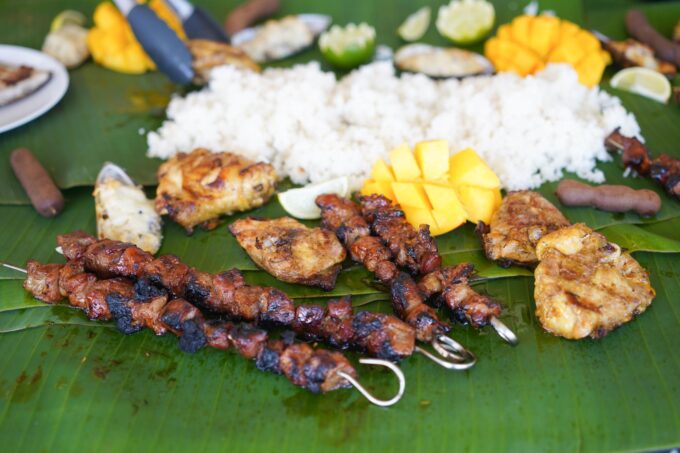
While eating with your hands might seem like an inelegant way of consuming food in the West, it’s a very much accepted way of eating in the Philippines. Growing up in the Philippines at my grandparents’ kitchen table, I can still feel the textural memories of rice in between my fingers or picking up steaming lechon pieces from the center of the table.
To eat with your hands is fairly still common in the Philippines and in many Filipino American households, but at restaurants you most likely see Filipinos use utensils like spoons, forks, knives, and chopsticks based on the restaurant.
Kamayan feast food ideas
A boodle fight is a great way of throwing a party because you can have a variety of different foods and it also gives you a good reason to have fun with your food and eat with your hands. Here are some ideas of what to include which have my favorite dishes to serve during boodle fights.
Lechon belly
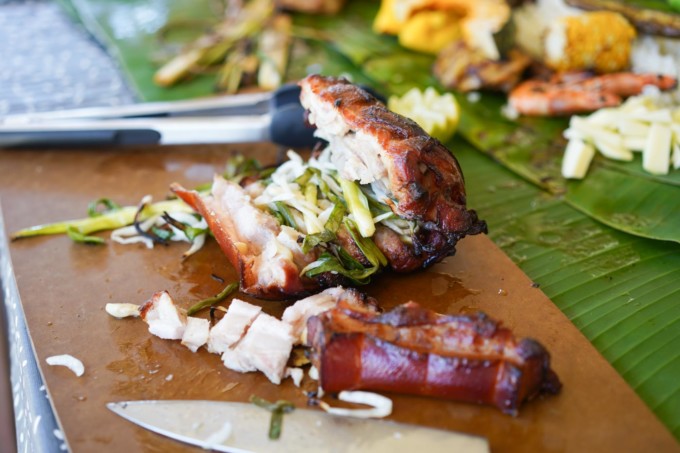
If you are having a small party, or just don’t want a full lechon, then lechon belly is a great option for the main entree. It’s got ultra crispy skin that’s been marinated with a brine of onions, lemongrass, garlic, and so many more fragrant herbs and spices for hours. Also known as Cebuchon, this type of lechon belly is known for its supple and flavor-infused meat and extra crispy layer of skin that’s roasted over a fire for hours at a time. If you don’t have time to make lechon belly at home, you can buy it pre-made at Grill City or other Filipino restaurants.
Chicken inasal
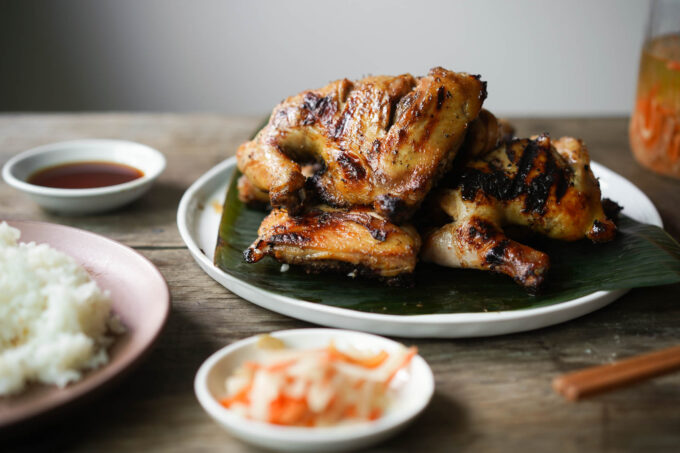
Chicken inasal is a great introduction to Filipino grilled meat if you want to try something other than pork. This char-grilled and lemongrass and chili marinated dish is a Visayan favorite. It’s got citrusy, smoky, and peppery notes of flavor throughout the tender and roasted chicken thighs.
I enjoy marinating and grilling chicken inasal at home because I can adjust the level of sweetness, citrus, and annatto chili oil used. However, you can also buy chicken inasal at restaurants like Grill City.
Filipino pork bbq skewers
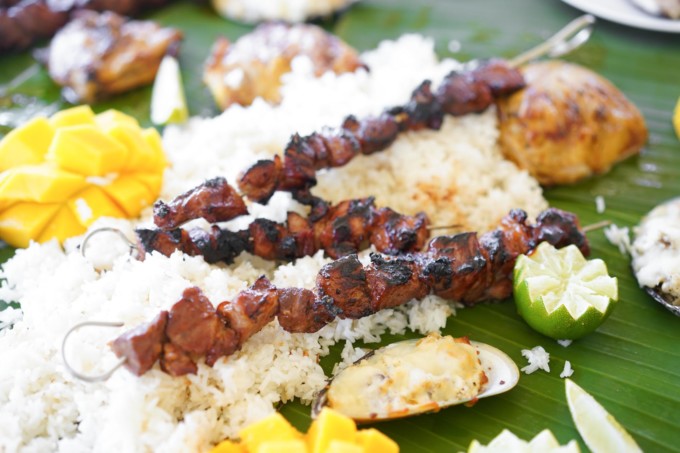
My all-time favorite type of bbq is Filipino pork bbq skewers and these are always a hit at any kind of party. With tender pieces of sweet marinated and chargrilled pork pieces skewered onto bamboo rods, it makes eating kamayan super easy because you just eat from a stick.
While I love making these pork bbq skewers from scratch if you don’t have time to make it you can buy premade skewers in the frozen aisle at your local Seafood City or cooked skewers at restaurants like Grill City.
Sinangag (garlic fried rice)
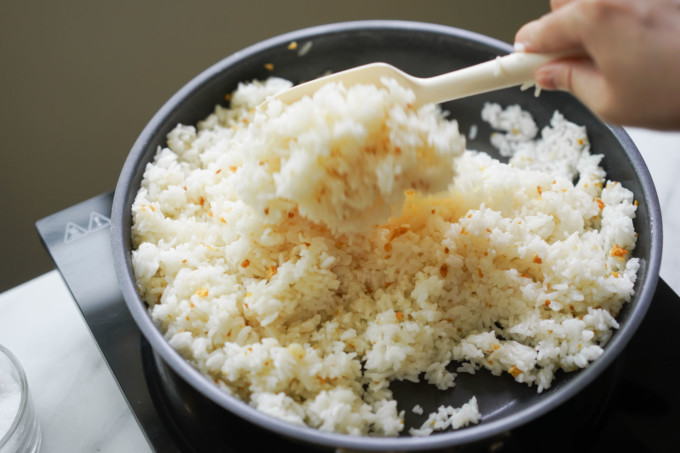
No Filipino meal is served without one of the most important side dishes, sinangag (or garlic fried rice). It’s a simple combination of day-old white rice, oil, and fragrant garlic pieces mixed together. Sinangag is perfect for breakfast, lunch, dinner, and boodle fights because it’s light, and its simple flavors pair well with many sweet, smoky, and fried Filipino dishes.
You can typically find sinangag placed in the center of the boodle fight with the ulam sprinkled on top and surrounding it. Sinangag is best made at home because it’s so simple and you probably will have ingredients already. You can also buy premade sinangag at your local Filipino restaurant too.
Lumpiang shanghai
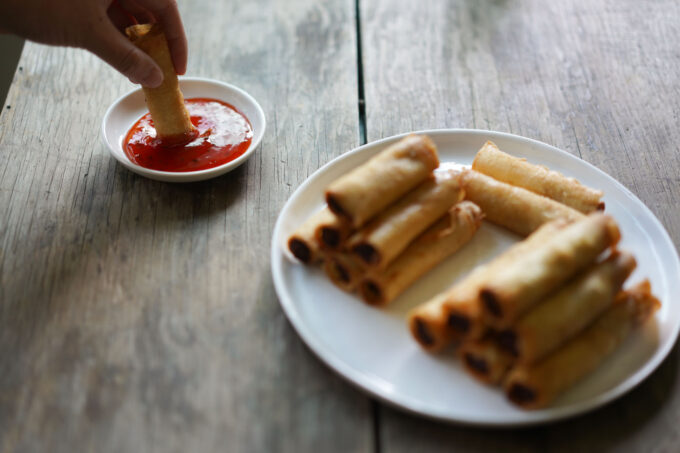
Ultra crispy fried spring rolls are an ultimate appetizer for boodle fights because they’re the perfect finger food. Lumpiang shanghai, or lumpia for short, are Filipino fried spring rolls that are filled with ground pork and a variety of minced vegetables like carrots, onions, and garlic. If you can’t make lumpia fresh, there are plenty of pre-made frozen packs at your local Seafood City and even some American grocery stores.
Atchara
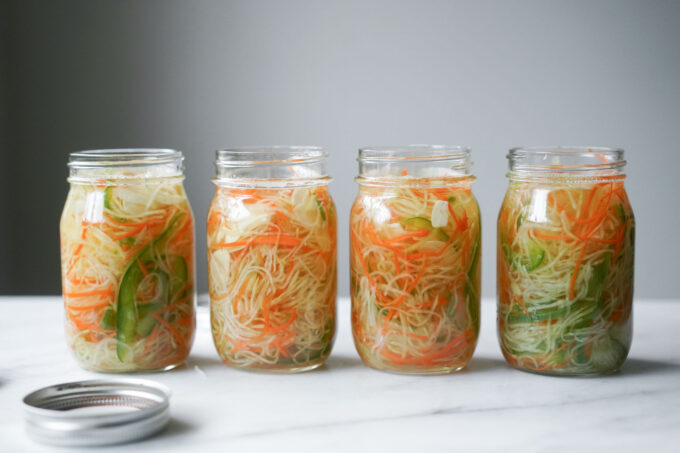
What better side to add to sweet bbq pork or char-grilled chicken are pickles! Atchara is a super simple pickling recipe that is made of thinly sliced green papaya, carrots, and a sweetened quick brine. While you can add many other ingredients like green bell peppers or even raisins, you can customize it based on your preference when you make it at home.
Some stores sell premade atchara with your grilled to-go items (like at Grill City), but I’ve always made it at home because the recipe is super easy and fast.
Puto
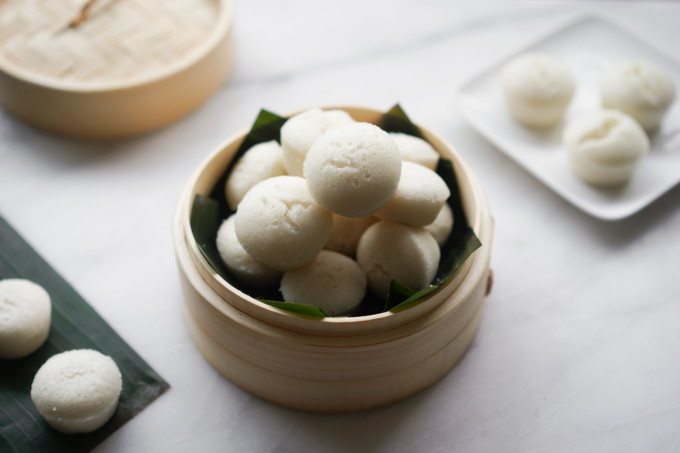
Boodle fights have the ultimate variation of dishes, so it’s not odd to see desserts on the same table. Desserts like puto (or steamed rice cakes) are like icing on a cake–they add another level of feasting. These light and sweet steamed rice cakes are a traditional dessert that are a variety of kakanin (aka rice cake).
While it’s a rice cake, it’s both a dessert and savory item that is often eaten with foods like dinuguan (blood stew). You can top them with cheese and salted duck egg slices, or eat them plain. They’re fairly easy to eat at home, but you can also find them at Filipino bakeries like Valerio’s Bakery.
Bibingka
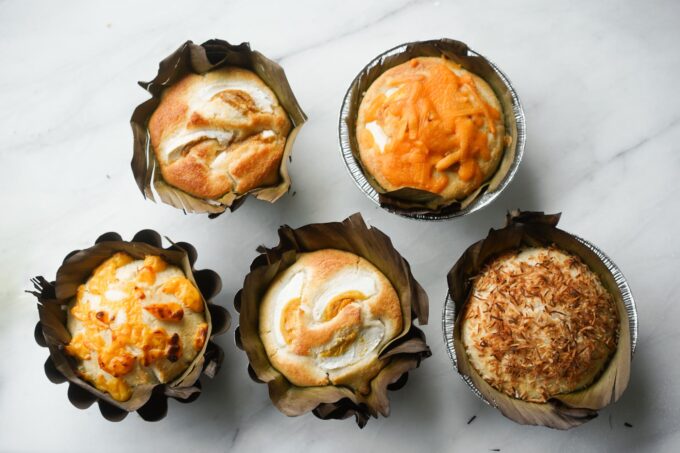
Bibingka is another traditional kakanin from the Philippines that is a baked rice cake and is typically eaten during the holidays. But this doesn’t stop people from baking and eating it during a boodle fight. Like puto, you can also have varied types of toppings like salted duck egg slices, cheese, and coconut shreds. I like making it at home with rice flour and baking it in the oven, but you can also find it at Valerio’s Bakery if you don’t have time to bake it at home.
Biko
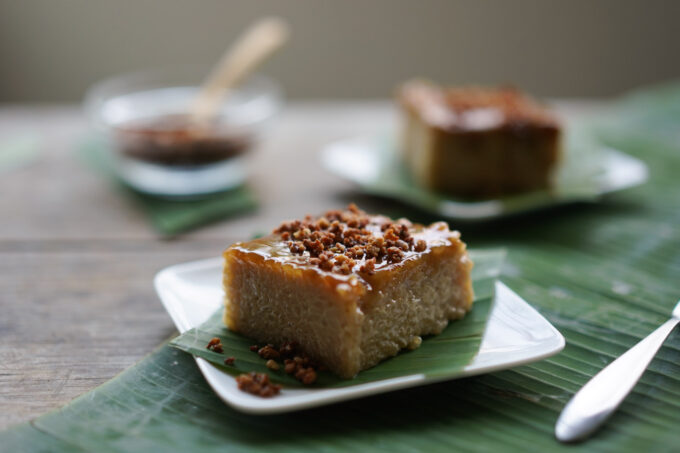
Sweet and sticky rice cake made from rich coconut milk, palm, and dark sugar, and topped with even more coconut custard is one of my favorite kakanin to eat at boodle fight. What’s great about biko is that you can premake it the day before and let it sit on the counter for an hour before serving it in slices for boodle fights. You can also buy it pre-made at Seafood City or Valerio’s Bakery.
Other additions to boodle fights are also grilled seafood like grilled milkfish, steamed mussels, and grilled shrimp. For more variety, I also like to add some fresh ripe mangoes, slices of tomato, coconuts, and boiled okra. What’s great about boodle fights and eating kamayan style is there is literally no wrong way to do it (just make sure to let go of any utensils!).


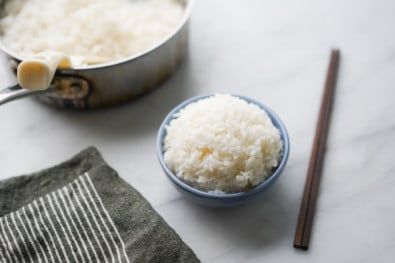







Great article on Boodle Fight Feast. Thank you.